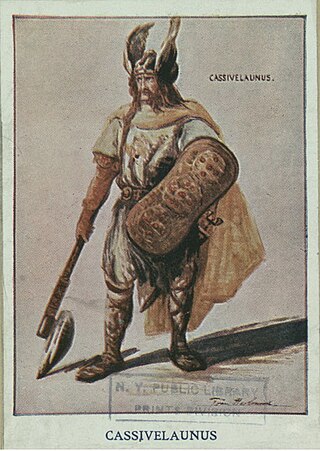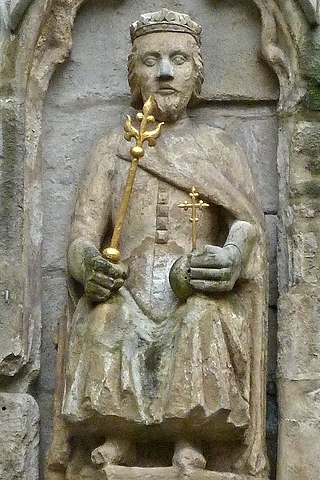Life
Geoffrey portrays him as being an ill-tempered yet kind ruler most of the time. Most of the time he gave out gifts handsomely. During his reign, the king of the Morini invaded Northumberland and laid waste to the countryside. Morvidus met the king of Moriani in battle and defeated the invaders. After the battle, he had every captive soldier brought before him and personally killed each one, feeding his lust for blood. When he became tired, he skinned and burned the remaining soldiers.
He fought and killed a giant using an uprooted tree stripped of bark and branches. For this reason, he is associated with the symbol of a ragged staff, which appears in the crest of the Earl of Warwick who are believed to be descended from Morvidus. [3]
Later in his reign, a dragon or monster appeared from the Irish Sea and began devouring the inhabitants of the western shores. In an attempt to stop this, Morvidus met the beast in single-combat and used every weapon he could against her, but to no avail. The monster lunged at Morvidus and consumed him. Morvidus had five sons: Gorbonianus, Archgallo, Elidurus, Ingenius, and Peredurus, all of which became kings of the Britons. Of these five sons, Gorbonianus, the eldest, was his direct successor.

Ambrosius Aurelianus was a war leader of the Romano-British who won an important battle against the Anglo-Saxons in the 5th century, according to Gildas. He also appeared independently in the legends of the Britons, beginning with the 9th-century Historia Brittonum. Eventually, he was transformed by Geoffrey of Monmouth into the uncle of King Arthur, the brother of Arthur's father Uther Pendragon, as a ruler who precedes and predeceases them both. He also appears as a young prophet who meets the tyrant Vortigern; in this guise, he was later transformed into the wizard Merlin.
The Battle of Badon, also known as the Battle of Mons Badonicus, was purportedly fought between Britons and Anglo-Saxons in Post-Roman Britain during the late 5th or early 6th century. It was credited as a major victory for the Britons, stopping the westward encroachment of the Anglo-Saxon kingdoms for a period.

Cadwallon ap Cadfan was the King of Gwynedd from around 625 until his death in battle. The son and successor of Cadfan ap Iago, he is best remembered as the King of the Britons who invaded and conquered Northumbria, defeating and killing its king, Edwin, prior to his own death in battle against Oswald of Bernicia. His conquest of Northumbria, which he held for a year or two after Edwin died, made him one of the last recorded Celtic Britons to hold substantial territory in eastern Britain until the rise of the Welsh House of Tudor. He was thereafter remembered as a national hero by the Britons and as a tyrant by the Anglo-Saxons of Northumbria.

Locrinus was a legendary king of the Britons, as recounted by the 12th-century chronicler Geoffrey of Monmouth in his Historia Regum Britanniae. He came to power in 1125BC.

Cassivellaunus was a historical British military leader who led the defence against Julius Caesar's second expedition to Britain in 54 BC. He led an alliance of tribes against Roman forces, but eventually surrendered after his location was revealed to Julius Caesar by defeated Britons.
Gwendolen, also known as Gwendolin, or Gwendolyn was a legendary ruler of ancient Britain. She came to power in 1115BC.

Leir was a legendary king of the Britons whose story was recounted by Geoffrey of Monmouth in his pseudohistorical 12th-century History of the Kings of Britain. According to Geoffrey's genealogy of the British dynasty, Leir reigned around the 8th century BC, around the time of the founding of Rome. The story was modified and retold by William Shakespeare in his Jacobean tragedy King Lear.
Cunedagius was a legendary king of the Britons, as recounted by Geoffrey of Monmouth. He came to power in 850BC.

Belinus was a legendary king of the Britons, as recounted by Geoffrey of Monmouth. He was the son of Dunvallo Molmutius and brother of Brennius and came to power in 390 BC. He was probably named after the ancient god Belenus.

Brennius was a legendary king of Northumberland and Allobroges, as recounted by Geoffrey of Monmouth. He was the son of Dunvallo Molmutius and brother of Belinus, probably based upon one or both of the historical Brenni. He came to power in 390 BC.
Archgallo was a legendary king of the Britons as recounted by Geoffrey of Monmouth. He ruled from 339BC. He was the second son of King Morvidus and brother of Gorbonianus.
Ingenius is a legendary king of the Britons as recounted by Geoffrey of Monmouth's pseudohistorical work Historia Regum Britanniae, written c. 1138 CE. Ingenius was the fourth son of King Morvidus and the brother of Gorbonianus, Archgallo, Elidurus, and Peredurus. He came to power in 317BC.
Elidurus the Dutiful was a legendary king of the Britons as recounted by Geoffrey of Monmouth. He reigned in the late fourth century BC. He was the third son of King Morvidus and brother of Gorbonianus, Archgallo, Ingenius, and Peredurus.

Historia regum Britanniae, originally called De gestis Britonum, is a pseudohistorical account of British history, written around 1136 by Geoffrey of Monmouth. It chronicles the lives of the kings of the Britons over the course of two thousand years, beginning with the Trojans founding the British nation and continuing until the Anglo-Saxons assumed control of much of Britain around the 7th century. It is one of the central pieces of the Matter of Britain.
Arvirargus or Arviragus was a legendary British king of the 1st century AD, possibly based upon a real person. A shadowy historical Arviragus is known only from a cryptic reference in a satirical poem by Juvenal, in which a giant turbot presented to the Roman emperor Domitian is said to be an omen that "you will capture some king, or Arviragus will fall from his British chariot-pole".
Gorbonianus was a legendary king of the Britons as recounted by Geoffrey of Monmouth. He came to power in 349BC. He was the eldest son of King Morvidus, and the brother of Archgallo, Elidurus, Ingenius, and Peredurus.
Peredurus is a legendary king of the Britons in Geoffrey of Monmouth's pseudohistorical chronicle Historia Regum Britanniae. According to Geoffrey, he was the youngest son of King Morvidus and brother of Gorbonianus, Archgallo, Elidurus, and Ingenius. He came to power in 317 BC.

Conan Meriadoc is a legendary British Celtic leader credited with founding Brittany. Versions of his story circulated in both Brittany and Great Britain from at least the early 12th century, and supplanted earlier legends of Brittany's foundation. His story is known in two major versions, which appear in the Welsh text known as The Dream of Macsen Wledig, and in Geoffrey of Monmouth's Historia Regum Britanniae. Both texts associate him with Magnus Maximus, a Roman usurper against the Valentinianic dynasty who was widely regarded as having deprived Britain of its defences when he took its legions to claim the imperial throne. Conan's cousin or sister, Saint Elen, is said to have been Macsen Wledic's wife.
Mandubracius or Mandubratius was a king of the Trinovantes of south-eastern Britain in the 1st century BC.
Cuthwulf, also sometimes Cutha, was the third son of Cuthwine, and consequently a member of the House of Wessex. Although a member of the direct male line from Cynric to Egbert, Cuthwulf was never king. He is said to have been born circa 592, and his death date is unknown.







